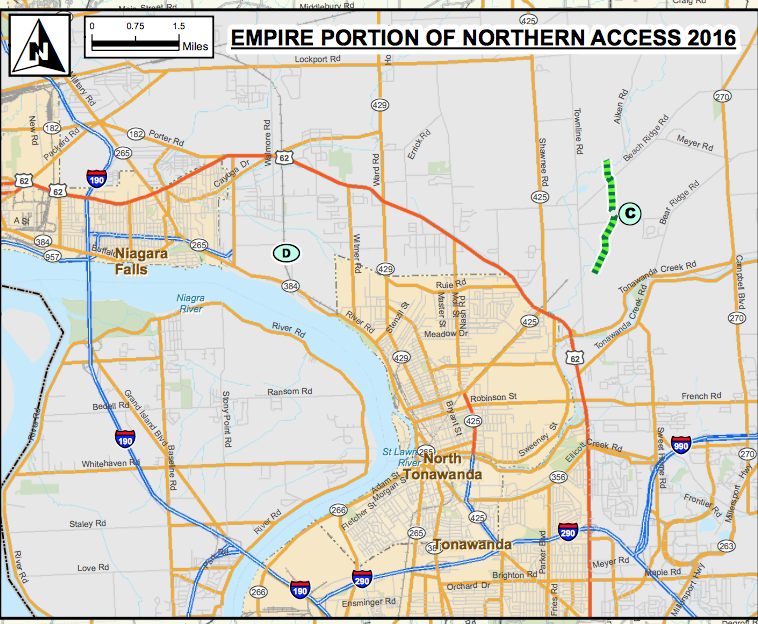Water Permits Denied for Pipeline Construction Project

The New York State Department of Environmental Conservation has denied the Clean Water Act Section 401 Water Quality Certification and other state stream and wetland permits for National Fuel Gas Company’s Northern Access Project.
“After an in-depth review of the proposed Northern Access Pipeline project and following three public hearings and the consideration of over 5,700 comments, DEC has denied the permit due to the project’s failure to avoid adverse impacts to wetlands, streams, and fish and other wildlife habitat,” Sean Mahar, a spokesman for the DEC, said. “We are confident that this decision supports our state’s strict water quality standards that all New Yorkers depend on.”
Ronald J. Tanski, President and Chief Executive Officer of National Fuel Gas Company, says construction of the project would not have significantly harmed New York’s water bodies.
“While we are still analyzing the NYS DEC’s rationale, the denial is purportedly based upon NYS DEC’s determination that Supply and Empire’s construction activities will impermissibly affect the quality of waters in the state, notwithstanding voluminous detailed studies prepared and submitted by the companies and our consultants that show any such effects are temporary and minor,” said Ronald J. Tanski, President and Chief Executive Officer of National Fuel Gas Company. “These construction activities would certainly have less effect than either exploding an entire bridge structure and dropping it into Cattaraugus Creek (Route 219) or developing and continuously operating a massive construction zone in the middle of the Hudson River (Tappan Zee Bridge) for a minimum of five years, both NYS DEC approved projects. We and our contractors have a great record with respect to our construction practices. Our Empire Connector, Tioga County Extension, and Tuscarora Lateral projects were completed through NYS DEC Region 8 between 2007 and 2015, consisting of 110 total miles of pipeline and crossing 104 streams and 182 wetlands, and utilizing the same proposed construction practices with an excellent environmental record.”
According to Tanski, the timing of the DEC’s decision is very concerning, not just for this project, but future pipeline construction projects also.
“What is perhaps the most troubling aspect of this decision is that the NYS DEC waited literally until the 11th hour to issue this denial, even though we had detailed discussions with NYS DEC staff over a 34-month period and undertook detailed engineering and environmental studies at the agency’s request, to support the stream-crossing techniques that now form the basis of their denial,” Tanski said. “We believe the NYS DEC’s analysis completely ignores the record that we developed in this process and is inconsistent with the standards of the Clean Water Act. Further, it attempts to set a new standard that cannot possibly be met by any infrastructure project in the state that crosses streams or wetlands, whether it is a road, bridge, water, or an energy infrastructure project.”
Tanski also added that this ruling is a major setback for state utilities seeking to meet their customer’s future energy needs.
“New York’s continued denial of permits for energy infrastructure projects is simply not sustainable, as it will have the effect of reducing New York’s energy reliability, lead to higher costs for consumers and be a limiting factor in the ability for industry to locate or expand in the state,” Tanski said. “Today, 57 percent of the electric generation capacity in the state is powered by natural gas, and, as more coal and nuclear power plants are scheduled to be shut down, new gas-fired plants are being built in their place. Additional natural gas infrastructure is essential to connect nearby, growing supply areas to New York consumers.”
Related News
Related News

- Keystone Oil Pipeline Resumes Operations After Temporary Shutdown
- Biden Administration Buys Oil for Emergency Reserve Above Target Price
- Freeport LNG Plant Runs Near Zero Consumption for Fifth Day
- Enbridge to Invest $500 Million in Pipeline Assets, Including Expansion of 850-Mile Gray Oak Pipeline
- Williams Delays Louisiana Pipeline Project Amid Dispute with Competitor Energy Transfer
- Evacuation Technologies to Reduce Methane Releases During Pigging
- Editor’s Notebook: Nord Stream’s $20 Billion Question
- Enbridge Receives Approval to Begin Service on Louisiana Venice Gas Pipeline Project
- Russian LNG Unfazed By U.S. Sanctions
- Biden Administration Buys Oil for Emergency Reserve Above Target Price




Comments